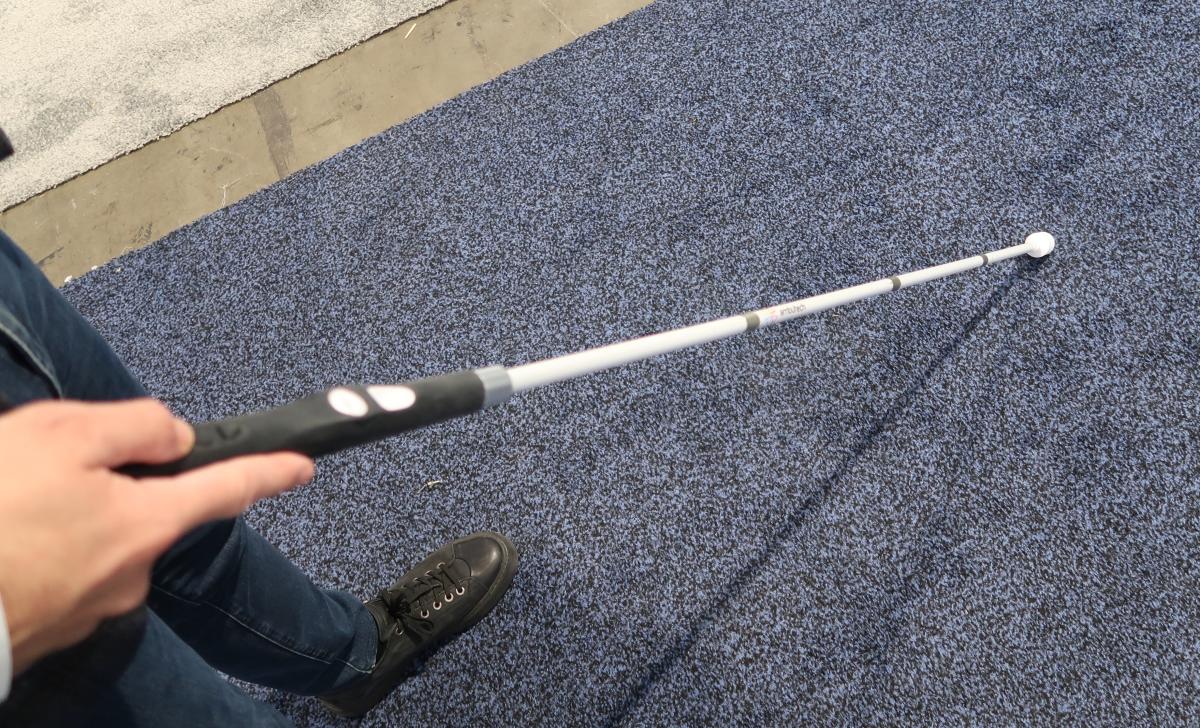WeWalk has introduced a new version of its smart cane for people with visual impairments in CES 2025which brings a redesign that addresses many of the shortcomings of the first model and adds AI features and more advanced sensors from TDK. It is positioned as an alternative to the traditional folding white cane. Co-founder Kursat Ceylan, who has been blind since birth, says the Smart Cane 2 can make mobility easier and safer, offering features such as turn-by-turn navigation and obstacle detection, along with a voice assistant powered by ChatGPT that puts on-demand information in users' hands without having to juggle a smartphone as well.
The WeWalk Smart Cane 2 has a slimmer handle than its predecessor, which should make for a more comfortable grip, and the company says it's about as light as a standard white cane. It has tactile buttons to make it easier to use, doing away with the previous model's touchpad which some people found difficult to use. Ceylan says it can be used in a variety of weather conditions, not just when it's hot and dry (WeWalk describes the new cane as “rainwater resistant”). Battery life is approximately 20 hours.
“You can fold and unfold it when you need it. There is a speaker, microphone, obstacle detection technology, and a flashlight to make visually impaired people more visible at night. And it also has motion sensors on its own to provide a more accurate navigation experience,” Ceylan explained.
Under the hood, the WeWalk Smart Cane 2 has an ultrasonic time-of-flight sensor, an inertial measurement unit with six-axis motion tracking, a pulse density modulated microphone and a barometric pressure sensor from the electronics company. which is TDK. When it detects something ahead, it alerts the user with both haptic and audio feedback, according to Ceylan.
He demonstrated it in the crowded, noisy environment of the Las Vegas Convention Center, and I could hear the crowd as the cane told him he was approaching an obstacle — in this case, a carpeted step marked in yellow and black. that tape. which I saw many CES attendees stumble upon in our conversation. It can also connect to headphones via Bluetooth.
Paired with your smartphone, it can provide navigation instructions and information about your surroundings, as well as public transportation options. “You can hear the names of the stores and restaurants you pass,” he said. At Starbucks, where she couldn't read the menu, she said she might ask the assistant if they sell chocolate croissants.
“You don't need to hold your smartphone while you're going somewhere,” Ceylan said. “You can put it in your pocket and then you can get all the information through your WeWalk smart cane.” There is a smartphone interface for those who want to use it, however, which he touched through the demo so I could see what was happening on the other end. Unlike most of the products I encountered at CES this year that seemed to include AI or ChatGPT for no real reason other than the fact that they could, this actually felt like a situation where it made sense and could be useful. .
Since this is new, we don't yet know how to translate all of this into real-world use. Pre-orders for the WeWalk Smart Cane 2 are now open, and the first wave is expected to start shipping before the end of this month. There are two pricing models: $850 for the smart cane and a subscription for the voice assistant that costs $4.99 per month, or $1150 with no additional subscription fees for full AI use. The WeWalk Smart Cane 2 is available worldwide.
The London-based startup also has a partnership with the Canadian National Institute for the Blind (CNIB) starting in February, when the organization will begin using the WeWalk Smart Cane 2 for its cane training program. The goal is to gather meaningful data for instructors so they can really understand how people use mobility canes (AI-enabled or otherwise), and help them get the most out of the tools. That, says Ceylan, “is very important, because the better you move, the better you participate in life.”
Update, January 9 2025, 11:55AM ET: This story has been updated to add details on the smart cane's battery life.



